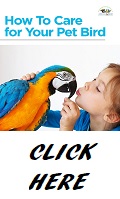

|
Caring for Pet Birds How to Take Care of a Pet Bird Body Language Breeding Lories and Lorikeets A Sick Bird Finding a Good Breeder Choosing the Right Pet Bird Choosing Bird Toys Determining the Sex of a Bird...Sexing a Bird Caring for a Pet Bird...Creating The Correct Environment Feeding Grooming Handfeeding Baby Birds Identifying Sick Pet Birds Selecting a Cage Teaching Simple Tricks How to Teach Your Pet Bird to Stop Biting Stress Can Kill Your Pet Bird How to Teach Your Pet Bird to Talk The First Month |
How to Take Care of a Pet Bird - Safety Despite the fact that some of them can outlive their owners, birds are more fragile than many other types of animals. In fact, miners used this weakness to stay safe underground. They often carried a canary with them because they knew these birds were so sensitive that the canary would die if the air in the tunnel was unhealthy. Despite the fact that some of them can outlive their owners, birds are more fragile than many other types of animals. In fact, miners used this weakness to stay safe underground. They often carried a canary with them because they knew these birds were so sensitive that the canary would die if the air in the tunnel was unhealthy.
Pet birds have this same susceptibility to unhealthy odors. Teflon pans, aerosol sprays and even furniture polish can be lethal for your birds. Always be sure to use anything with a strong odor in a well-ventilated area that is well away from your birds. Another serious danger for pet birds is their desire to chew. For example, pet birds will chew on welded items and may develop lead poisoning from the soldered joints. They will also nibble on potted plants. Be sure that any plants near your bird's cage are not toxic. If you aren't sure, you may want to move them just to be safe. Despite all the reports to the contrary, poinsettia plants are not poisonous. Providing a safe alternative, such as a small pot of parsley can help your birds avoid the temptation to nibble on your houseplants. When you feed your birds fresh food, you usually are doing something good for your birds. However, there are some things you should not feed them. Avocado, coffee and chocolate are toxic to birds. As you approach the holiday season, you will probably be bringing a Christmas tree into the house. Many people see the tree and naturally assume that their birds can enjoy climbing on it. However, many Christmas trees are toxic to birds, especially if they have been treated with any type of preservatives. In addition, many of the ornaments and the electric lights can pose a safety hazard. Of course, if your bird does not have clipped wings, there are quite a few additional safety concerns that you will face. First, you should be sure that all of your windows have curtains or shades so that you can cover them while your bird is out. If you have glass doors, they should be covered as well. If you don't use curtains or shades, you should place safety decals on the glass so your birds can tell the glass is there. More than one bird has flown into glass and broken his neck. Mirrors and other large reflective surfaces pose the same problem. Next, you should be sure you don't have standing water accessible when your bird is out. Your bird can drown in the toilet or the kitchen sink in a matter of seconds. Cooking while a bird that can fly is out is also a bad idea, especially if you have an uncovered pot on the stove. Finally, more than one bird owner has forgotten that his bird was perched on his shoulder when he has hurried to answer the door. Naturally, this gives the bird a chance to fly away. Never carry your bird to an open door, even if his wings are clipped. Even a bird with clipped wings can still glide quite far if he catches an updraft. |
How to Care for a Pet Bird: Safety - Copyright 2021 by Donovan Baldwin
Page Updated 5:47 PM Thursday, September 16, 2021